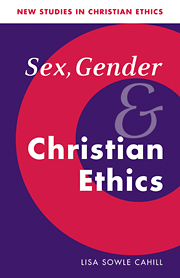Book contents
- Frontmatter
- Contents
- General editor's preface
- Acknowledgments
- 1 Sex, gender, and the problem of moral argument
- 2 Feminism and foundations
- 3 Particular experiences, shared goods
- 4 “The body” – in context
- An interlude and a proposal
- 5 Sex, gender, and early Christianity
- 6 Sex, marriage, and family in Christian tradition
- 7 The new birth technologies and public moral argument
- Concluding reflections
- Notes
- Index
- New Studies in Christian Ethics
3 - Particular experiences, shared goods
Published online by Cambridge University Press: 05 June 2012
- Frontmatter
- Contents
- General editor's preface
- Acknowledgments
- 1 Sex, gender, and the problem of moral argument
- 2 Feminism and foundations
- 3 Particular experiences, shared goods
- 4 “The body” – in context
- An interlude and a proposal
- 5 Sex, gender, and early Christianity
- 6 Sex, marriage, and family in Christian tradition
- 7 The new birth technologies and public moral argument
- Concluding reflections
- Notes
- Index
- New Studies in Christian Ethics
Summary
The ethics of Aristotle and of Thomas Aquinas are teleological, eudaimonistic, and realist. Both are also practical and prudential. Human activity is purposeful; it aims at happiness. The goods which are constitutive of happiness, as well as the activities and virtues which realize those goods, are not mere social constructions or psychological projections. They are objective, stable across cultures, and knowable by human reason. The way in which they are known is not by examining the structures of reason itself, but by inductive reflection on, and generalization from, human experiences of need, of lack or deprivation, of fulfillment and flourishing, and of social cooperation. Moral knowledge, in this view, is not read directly from experience as sheer fact; the existence of a practice or its wide acceptance cannot as such yield a moral law. Morality requires reasonable reflection on human existence, fine discrimination of goods whose possession truly constitutes happiness, and judgments about which activities lead to those goods and which do not. Real understanding of the natural law and its practical demands requires virtue and prudence.
In a Thomistic perspective, the concept “nature” is a means to establish moral goods or ends on the basis of human experience itself, to give goods a morally compelling character by presenting them to choice as a “law,” and to set human goods and morality within the larger scheme of divine providence by defining the natural law as derivative from the divine reason or the “eternal law.”
- Type
- Chapter
- Information
- Sex, Gender, and Christian Ethics , pp. 46 - 72Publisher: Cambridge University PressPrint publication year: 1996

